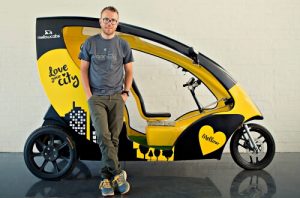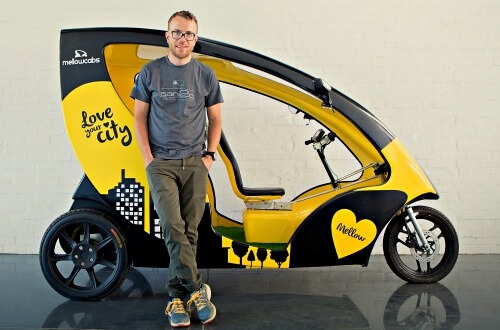
It is estimated that about 65% of trips in urban areas are less than four kilometres, according to Ventureburn. This is where Cape Town-based transport startup, Mellowcabs, is hoping to make a dent. The startup helps to bridge the gap between various public transport offerings by providing on-demand last-mile transportation.
What Mellowcabs is getting right is diversifying both its revenue and business models.
The company’s main revenue source is selling branded advertising space on its lightweight electric vehicles and on-board devices. The locally-produced vehicle shells are illuminated to make both the cabs and advertising more visible and so provide even more lucrative advertising space, says startup founder and CEO Neil du Preez.
The transport startup has added tech to the mix with their on-board tablet computers which are available in the vehicles. Now the startup offers geo-activation advertising which allows advertisers to personalise their messages based on people’s current location, in real time. They also use social media platforms like Facebook and Twitter to connect with their customers.
These tablet computers, du Preez says, feature the company’s own propriety software, and are meant to offer an interactive experience to passengers.
The company recently secured a three-month advertising contract to the value of R2.5 million with a multi-national fashion label on 40 of their cabs, according to the company’s profile on Siemens Stiftung, an international foundation that promotes sustainable social development.
The second revenue stream, which is typically how most cab businesses make their income, is through paying customers. Mellowcabs has opted for a flat fee structure that patrons pay within about a 4km radius. The typical journey will cost the customer around R30, du Preez says.
Beyond just individuals, Mellowcabs is also targeting groups. They offer shuttle services to events such as conventions, sports events, trade shows and conferences.
Mellowcabs’ third revenue generator which is expected to become a significant income generator for the business, is its on-demand cargo delivery service. The service is facilitated through third party contracts, which means that the vehicles are leased to courier companies and retailers wanting to facilitate home deliveries.
“Home deliveries are one of the biggest growth markets in the new economy, as illustrated by massive investments in home delivery company Takealot.com,” du Preez says.
Based on the success of their model in South Africa du Preez is planning to take Mellowcabs to Europe and Asia and has pilot projects lined up in the UK, Germany, the Netherlands, Denmark, India “and a few other cool places,” he told Mail and Guardian in a recent interview.
A Winning Model
Du Preez has already garnered a number of awards for his relatively young startup. Some of the accolades under his belt include being named as one of the winners of the 2015 South African Climate Solver Awards by the World Wide Fund for Nature South Africa (WWF SA) as well as the Global Citizen award, presented in Puebla, Mexico in October in 2015.
Mellowcabs was listed as one of the seven most innovative companies in Africa by Forbes magazine and Du Preez was also among Mail & Guardian’s 200 Young South Africans of 2016.
The startup has also secured partnerships with the City of Cape Town and in Gauteng, to help facilitate Mellowcabs’ integration to these cities’ public transport infrastructure.
SME South Africa speaks with du Preez about his multi-pronged revenue model and why last mile transportation makes ‘cents’.
A powerful multiple income sources model
We have multiple income sources, passenger fares, (we provide a more affordable option than traditional cabs) and selling advertising space on, and in the vehicles. Advertising on our vehicles has proven to be very powerful and lucrative.
There is also cargo delivery. It makes sense. We have partnered with the biggest ride-share and logistics companies to bring these services to the consumer.
Getting the advertising spot on
We have a strong advertising agency representing us. Mellowcabs have been designed to be very safe and extremely visible, and to offer optimum advertising space on an aesthetically pleasing design. [They are] designed to be a strong advertising medium and feature an on-board tablet, mobile charging facilities, surround sound, solar panel, regenerative braking etc. [We are receiving] very positive response from passengers and road users.
Potential for growth in South Africa
The industry consists of approximately 15 000 meter cab taxis. The South African meter cab industry is estimated to have a turnover of more than R1 billion. Home deliveries are one of the biggest growth markets in the new economy, as illustrated by massive investments in home delivery companies: South African e-commerce website Takealot.com has managed to secure R1-billion in funding.
Powerful partnerships
Mellowcabs have approached various municipalities and private owners and operators of prime sites across South Africa with a view of operating at least 200 cabs at these destinations within the foreseeable (5-year) future.
We will be based around these focus areas, however, passenger can book our services through the mobile app, providing them with a true on-demand service.
Over and above Gauteng and the Western Cape, we have also had great success on a national level and roll-out in other provinces of South Africa will commence after having bedded down our Gauteng and Western Cape roll-out.
Tackling the last mile transportation market
I’ve always been really interested in public transport systems, and what it can mean for an individuals and the economy. Growing up in South Africa we didn’t have access to public transport. Then, after living abroad for a few years I started seeing transit systems in a new light.
Mobility is a precondition for economic growth: mobility for access to jobs, education, health, and other services. Mobility of goods is also critical to supply world markets in our globalized economy.






